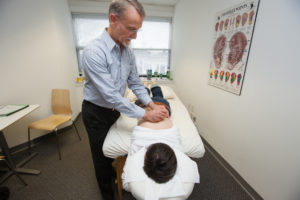Did you know that acupuncture is at least 2,500 years old? This form of complementary medicine has been used as a method for treating mind and body ailments since well before any modern medicine—like penicillin—was discovered.
While the scientific medical community has a ways to go with researching and understanding how eastern medicine translates into western modes of medicine, the underlying principles for understanding and treating the human body has remained largely the same.
Western and Eastern medicine: Effective in different ways
In simplest terms, your doctor’s job is to maintain and restore your health by helping to prevent and treat any illness. If you went to the doctor feeling sick, you probably went through a battery of tests, like getting your blood pressure taken or having your chest listened to with a stethoscope. The doctor does this to learn how your body’s working and provide a diagnosis. One symptom can hint at signs of a larger problem.
The same is true in acupuncture and traditional Chinese medicine (TCM). When I first meet a patient, I’ll listen for pulse and test other measures to see if the body is functioning properly. The mind can also have very powerful effects on the body (see how gratitude can affect health). That’s why I also ask a series of intake questions to better understand the root cause of the problem.
While western medical practitioners may give you a pill that interacts with your body to create different chemical reactions, eastern medical practitioners use points on the skin to stimulate different reactions throughout the body.
But while both of these forms of medicine look at the body as a system and try to understand where the system goes wrong (and treat the underlying problem in different ways), there has been far more structured research around what makes western medicine “work.”
Studies show…
Even though TCM is far older than what we understand as “medicine” today, the practice still has a way to go in terms of being methodically documented and analyzed through well designed research.
Acupuncture skeptics point to evidence from literature reviews that factors like expectation and belief may play important roles in the beneficial effects of acupuncture on pain. Ted Kaptchuk, Professor of Medicine and Professor of Global Health and Social Medicine at Harvard Medical School, has been a leading figure in placebo studies, with a background himself in East Asian studies and Chinese Medicine.
So if belief and expectation are important parts of the body as a system, does that make the treatment any less valid (or helpful)?
In a 2015 study, researchers found that acupuncture improved symptoms for patients in palliative care. According to the paper, “acupuncture effectively reduced symptoms of pain, tiredness, nausea, depression, anxiety, and shortness of breath, and enhanced feelings of well-being.”
In another study from March 2016, researchers found that consistent acupuncture treatments appeared to offer significant relief of physical disability and pain for veterans with Gulf War Illness.
So what’s happening?
In short, we don’t totally know yet.
A 2010 scientific review in Neuromodulation concluded that acupuncture stimulates the nerves of the skin and muscles, “modulating the imbalance” between different parts of the nervous system.
Another scientific review from Anesthesia and Analgesia showed that acupuncture is linked to higher levels of some types of endorphins (the “feel good” chemical produced by the nervous system) at the same time that patients reported decreases in their pain levels.
Prove it to yourself
If you have never tried acupuncture before, and are uncertain how it might work for you, let me show you! In addition to traditional (insertive) acupuncture, I practice a gentle, non-insertive style of acupuncture that does not break the skin. A recent study shows that it’s gentle enough to use on newborns.
Along the way, I will help you try to understand as best I can. But just because we may not fully understand the physiological mechanisms that underlie acupuncture, doesn’t mean that it can’t be a valuable treatment option for you.

